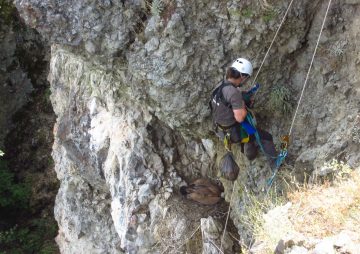During the end of June seven vultures were successfully measured, biologically sampled and tagged with rings and wing tags in the Rhodope Mountains of Bulgaria. The tagging operation will add to the valuable data currently being used to support the recovery and territorial expansion of the birds.

The operation was carried out as part of the ongoing LIFE Vultures project. The juvenile birds, aged between 1 and 4, were also tagged with GPS transmitters. Two more young chicks currently in nests will be tagged in mid-July.

The number of tagged griffon vultures in Rhodope Mountains rewilding area now stands at 25 birds. Previously fitted transmitters have already supplied valuable data on vulture migration, and this will soon be made available online via the LIFE Vultures project website.
Starting in 2016, the five-year LIFE Vultures project was developed by Rewilding Europe, in collaboration with the Rewilding Rhodopes Foundation and a range of other partners. Focusing on the Rhodope Mountains rewilding area in Bulgaria, as well as a section of the Rhodope Mountains in northern Greece, the aim of the project is to support the recovery and further expansion of the black and griffon vulture populations in this part of the Balkans, mainly by improving natural prey availability, and by reducing mortality through factors such as poaching, poisoning and collisons with power lines.
The tagging being carried as part of the LIFE Vultures project – the first of its kind in the Rhodope Mountains for griffon vultures, and the biggest for black vultures in the whole of the Balkans – is essential to maximising its success.
As GPS data is systematically fed into a Geographic Information System (GIS), together with a range of other variables, so the rewilding team and their partners are gaining groundbreaking insight into the movement of vulture populations in the monitoring area, the various threats that they face, and the best ways to support the birds’ comeback.
